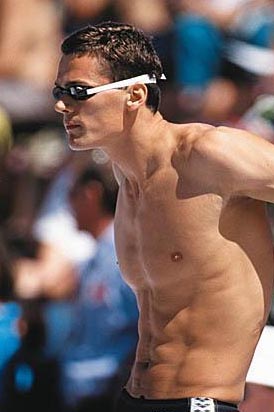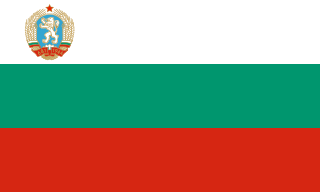Aleksandr Popov, (born April 26, 1975) is an Uzbekistani sprint canoer who competed in the mid-1990s. Competing for Yugoslavia, he was eliminated in the repechages of the K-1 500 m event at the 1996 Summer Olympics in Atlanta.
Aleksandr Popov, (born April 26, 1975) is an Uzbekistani sprint canoer who competed in the mid-1990s. Competing for Yugoslavia, he was eliminated in the repechages of the K-1 500 m event at the 1996 Summer Olympics in Atlanta.
Aleksandr or Alexander Popov may refer to:

Alexander Stepanovich Popov was a Russian physicist, who was one of the first persons to invent a radio receiving device.

Aleksandr Vladimirovich Popov, better known as Alexander Popov, is a former Russian swimmer. Widely considered the greatest sprint swimmer in history, Popov won gold in the 50-metre and 100 m freestyle at the 1992 Olympics and repeated the feat at the 1996 Olympics, and is the only male in Olympic games history to defend both titles. He held the world record in the 50 m for eight years, and the 100 m for six. In 2003, aged 31, he won 50 m and 100 m gold at the 2003 World Championships.

The Unified Team at the 1992 Summer Olympics in Barcelona, Spain, was a joint team consisting of twelve of the fifteen former Soviet republics that chose to compete together. The previously Soviet-occupied states of Estonia, Latvia, and Lithuania competed separately. The team has been informally called the Commonwealth of Independent States team, though Georgia was not yet a member of the CIS when it competed as part of the Unified Team. It competed under the IOC country code EUN. A total of 475 competitors, 310 men and 165 women, took part in 234 events in 27 sports.

Bulgaria competed at the 1972 Summer Olympics in Munich, West Germany. 130 competitors, 106 men and 24 women, took part in 92 events in 15 sports.

Alexander Popov is a 1949 biographical film directed by Herbert Rappaport about the life and work of Alexander Stepanovich Popov, who was a notable physicist and electrical engineer and an early developer of radio communication.

The Security Council of the Russian Federation is a constitutional consultative body of the Russian president that supports the president's decision-making on national security affairs and matters of strategic interest. Composed of Russia's top state officials and heads of defence and security agencies and chaired by the president of Russia, the SCRF acts as a forum for coordinating and integrating national security policy.
Alexandr Vladimirovich Popov is a Russian biathlete who competed for the USSR, the Unified Team and Belarus. Since 1999, he has been the head coach of the Belarus National Biathlon Team.

I Am Twenty is a 1965 drama film directed by Marlen Khutsiev. It is Khutsiev's most famous film and considered a landmark of 1960s Soviet cinema.
Herbert Rappaport (1908–1983), known in the Soviet Union as Gerbert Moritsevich Rappaport, was an Austrian-Soviet screenwriter and film director.

Aleksandr Fyodorovich Borisov was a Soviet actor, film director, screenwriter and singer.
The Russian Cup 2009–10 was the eighteenth season of the Russian football knockout tournament since the dissolution of Soviet Union. The competition started on April 20, 2009 and finished with the Final held on 16 May 2010.
Aleksandr Sergeyevich Popov is a former Russian professional football player.

The Governor of Leningrad Oblast is the head of executive branch for the Leningrad Oblast, considered as Prime Minister of Leningrad Oblast.
The Road is a 1955 Soviet action film directed by Aleksandr Stolper and starring Andrei Popov and Nikolai Gritsenko.
Aleksandr Popov is a Soviet and Russian weightlifter who competed in the 1980s and 1990s. He won several World and European medals.
The Little Cat is a 1996 Russian children's adventure film directed by Ivan Popov.
Slavic-Hill Rodnovery is one of the earliest branches of Rodnovery that emerged in Russia in the 1980s founded by Aleksandr Konstantinovich Belov (1957–), and one of the largest Rodnover movements in terms of number of practitioners, counted in the many tens of thousands. The movement is characterised by a military orientation, combining Rodnover worldview with the practice of a martial arts style known as "Slavic-hill wrestling". The locution "Slavic hill" refers to the kurgan, Indo-European warrior mound burials of the Pontic–Caspian steppe.